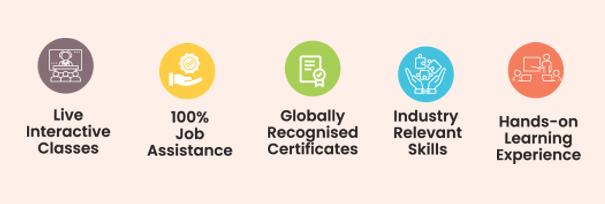With technology all around us and being a part of everything we do today, it comes as no surprise that we also generate a lot of data in the process. The data trail we all leave on a daily basis is not some waste. In fact, it has come to be one of the best things of all times since it gives companies multiple benefits and has also created numerous wonderful job opportunities in its wake.
But is data useful just as it is? Certainly not! those who wish to make any use of this data for their benefit need to put this raw data through a series of processes, which can only be carried out by experts of the field – namely data analysts.
As per the U.S. Bureau of Labor Statistics (BLS), the demand and need for data analysts is projected to grow >25% by 2029.
So, let’s get to understand better what is data analytics and its career scope in 2022 with this blog.
What is Data Analytics?
Data Analytics is the process of obtaining insights from raw data with the purpose of taking better informed business decisions. There are a few steps in turning raw data into useful data and the five iterative steps are –
- Identifying – taking into note the data that you wish to analyse
- Collecting – the desired set of data
- Cleaning – the data to ensure only useful data passes through
- Analysing – the given set of data
- Interpreting – the results derived from the analysis
Data Analytics can take multiple forms and that totally depends upon the answers that you are looking for.
There are four major types of Data Analysis –
- Descriptive Analysis – tells us what happened
- Diagnostic Analysis – tells us why it has happened
- Predictive Analysis – give us projections about the future trends
- Prescriptive Analysis – give actionable advice
What does a Data Analyst do?
The tasks of a data analyst are plenty. It includes but is not limited to gathering, cleaning, and studying data sets with the purpose of solving problems and giving solutions that will help solve problems faced by companies related to multiple topics and units.
Almost every industry today, at least the flourishing ones need a data analyst. Business, science, government, technology, medicine, criminal justice and finance are only a few sectors the require their expertise but the need has been seen and felt across many others.
There are a lot of questions that fall under the expertise of a data analyst. The central purpose is to manipulate the given data or information to be able to help organizations in making intelligent and beneficial decisions. The insights that are derived from this analysing is shared across with major stakeholders and big names, which ultimately end up bringing innovative steps in their firms.
While you already have an idea about what a data analyst does, here is a list of the things they are majorly responsible for –
- Gathering Data – There are multiple ways of gathering data and the task is more often than not done by the data analyst themselves. Tracking visitor characteristics on the company’s webpage, purchasing datasets from specialists and conducting surveys are some of the most commonly used ways of gathering data.
- Cleaning Data – Data that is being collected is raw in nature, meaning that it might contain errors, outliers or have duplicates. When a data analyst cleans data, they are basically working hard to maintain the quality and standard of the data via a programming language or in a spreadsheet so the interpretations are not skewed.
- Modelling Data – Designing and creation of the structures of a database comes under the task of modelling data. Many things happen here such as choosing the type of data that is collected and stored, establishing the relation between the various data categories and working on the layout of the data.
- Interpreting Data – Since the purpose of collecting and sieving the data is to find useful information, interpreting the data becomes essential. The data is interpreted with the purpose of finding trends or patterns that are the most common or prevalent, which in turn helps in finding answers to the questions faced by the organization.
- Presenting – The visualizations created are put together in form of graphs, reports and charts to present information to the parties that are interested. It is one of the key elements of your job profile.
Softs Skills needed to become a Data Analyst
While the job of a data analyst entails you working majorly with data, it does also come with having to meet people and carrying forward a team that works under you. Hence, you need people skills and great ones at that too.
As important as hard skills are to find the right job and get acceleration in your career, soft skills are needed too and in a good quantity. Depending upon your job title and the company you work in or if you plan on working as a freelancer or starting your own firm, it is essential to have the right set of skills to help you move forward and gain the right kind of success.
Here is a list of the top soft skills that you must possess. Where can you polish your soft skills and get personality development classes? At the right institute, these sessions come included in your course! So, choose wisely!
- Communication Expertise – Your job entails talking to big shot stakeholders and thus, you need to have refined communication skills. Breezy and confident talking is one of the most effective ways of getting ahead of your competition and there are simply no doubts about whether you need this skill or not.
- Critical Thinking – The field you are planning to work in requires you to possess the skill of critical thinking as you need to look as a single set of data from multiple angles and perspectives to be able to develop innovative techniques.
- Analytical Proficiency – Creating the right results is what any organizations expects from its employees and doing so from data constitutes as analytical proficiency. You need to be an expert in the field to be able to get ahead in your career.
- High Concentration – With the right focus and concentration level on the work, you will be able to generate beneficial outcomes for the organization, which will directly lead you to the path of success.
Areas you need to gain Expertise in!
As a data analyst, you need to great in a lot many things. Right from soft skills (as already mentioned) to core skills, there are quite a few areas you need to become pro in.
As a beginner, you might not be able to call yourself an expert in all the said arenas, but to be able to get to a senior level position, you need to ace yourself till the very top.
Here is a list of a few areas you need to gain expertise in to be able to get all the success you wish for in the field of data analytics –
- Mathematical Expertise – The basis of computer science is mathematics and hence, you are expected to be good in the subject and posses a certain level of expertise as well. Strong capabilities in the field will render you will skills to acquire the necessary information.
- Machine Learning (ML) – Changing trends calls for the need to upgrade yourself too. Machine learning has become an essential aspect of every data analyst’s learning. But it is not just restricted to machine learning but also goes on to statistical techniques, artificial intelligence (AI) and mathematical formulas.
- Microsoft Power BI – When an industry as a vast amount of data, Microsoft Power BI is the application that comes into play. It enables its users to generate effective visualizations and useful dashboards.
- R/ Python Programming Languages – You need to learn these leading programming languages as they expand the scope to offer frameworks for data collection and crawling. You can choose to be an expert in either or both.
- Structured Query Language (SQL) – Since SQL is considered to be the standard language for databases in the industry, it is also most commonly employed for working with huge datasets in a structured form.
Career Advancement with Data Analytics
Since the field is a pretty huge one, you can be certain that becoming a data analyst is not the only way to move forth. In fact, becoming a data analyst is just the beginning and will open up many doors for you.
After having started as a data analyst, you can go on to become a data scientist upon having gained a certain level of experience and expertise. A data scientist’s job entails using computer science, math and statistics with the purpose of analysing data. But since they employ advanced techniques and tools, their status is better than that of a data analyst and definitely, better pay too.
Path to be Followed
To be able to become a data analyst, you need certain skills that will help you rise up the ladder and here is how you can gain all the necessary skills.
- Get a Professional Level Certification
- Bachelor’s Degree
Conclusion
Beginning with the best gives you a sense of guarantee of also ending up with the best. Thus, what you need to do today is to enrol with the best institute that offers you an incredible data analytics course to be able to fully explore its career scope in 2022.






